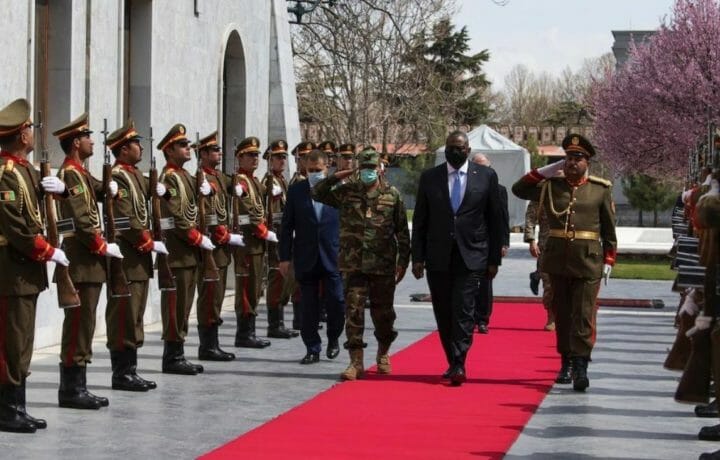Since the U.S./NATO Coalition withdrawal announcement of military forces, much has been written and pronounced about Afghanistan. As events continue to unfold, the story continues to evolve. And there are some key issues to continue to watch as the troop withdrawal continues to unfold.
Afghans Respond to Withdrawal News
The Afghan government took the news of total military withdrawal by September 2021 in-stride and thanked their security partners for nearly two decades of assistance and mentorship. The security leaders in Afghanistan have been discussing the upcoming changes with their forces, securing bilateral arrangements for security partnerships, and preparing for Taliban attacks across the country. Notably the President appointed Mr. Zia Asey as the director of Security Sector Reform (SSR) and Leadership Development. SSR and leadership are two key areas that Afghan security partners have stressed will be important for the sustainability of the ANDSF. This is also critical for preparation for integrating former combatants into the national security apparatus in the event of a peace process breakthrough.
Taliban Not Prepared for NExt Move
The Taliban have possibly been the most surprised entity in Afghanistan when it comes to the full withdrawal announcement. Beyond their propaganda statements claiming they have defeated a superpower; the Taliban seem ill-prepared to use the event strategically. Since the announcement, the Taliban have continued to attack innocent Afghan women and children, which only causes more Afghans to hate them. They have also continued their attacks against the ANDSF, which again only rallies the Afghan people behind their formal security sector. The ANDSF has been killing Taliban and other terrorists in daytime and night-time attacks across the country in response to the ongoing Taliban violence. It remains to be seen if the Taliban will realize they are now unifying their opposition with every attack. The Taliban are launching their annual attacks across the nation, but have yet to take, hold, and govern any major population centers. Watching the results of the Kandahar and Helmand battles could be useful as a sign for other outcomes.
Responses by Other Terrorists and Society
Terrorists in South Asia have stepped up their attacks on Afghans as well and been found heavily linked to the Taliban by the UN and other organizations. How they continue to function as the Taliban face future sanctions for not disconnecting from terrorists is an issue worth study. For now, the terrorist allies of the Taliban will play the usual role in providing deniability for the Taliban as they both kill civilians and commit war crimes.
Civil society in Afghanistan is bearing a large burden as the Taliban specifically target women, media members, and local government leaders for death. Women are being vocal about the risks to the society as the Taliban and their terrorist buddies ramp-up attacks. The common refrain is that the international community must continue to stay involved in the peace-making realm and continue to fund Afghan development and security needs.
Pakistan Also At Play
Pakistan as always is the key actor in the security situation in Afghanistan. President Ghani has called on Pakistani leaders to put their words into action, after many senior Pakistani’s pledged support for peace building in Afghanistan. If the Pakistani agents currently supporting the Taliban and aiding various terrorist groups, make any changes in their behavior is topic of interest to many. Pakistan so far has evaded the terrorism supporter labels that many are calling for. How long they can play their double game is the million-dollar question.
The U.S. and Afghanistan as Partners in the Transition
The U.S. government and other Afghan partners have been busy pledging to continue funding the security sector as most nations move their focus to diplomacy, development, and aid. Germany specifically pledged to continue funding police training. NATO and U.S. base commanders across Afghanistan have begun the formal handover of their facilities and training missions to their ANDSF partners. The ceremonies have been dignified and most include the lowering of a nations flag and the raising of the flag of Afghanistan.
A few words from President Ghani from his article in Foreign Affairs this week summarize the position of the Islamic Republic of Afghanistan. “Today, our government and our security forces are on a much stronger footing than we were seven years ago, and we are fully prepared to continue serving and defending our people after American troops depart.”
President Ghani, and many Afghans on social media this week see the withdrawal as an opportunity for Afghans to fully establish themselves as sovereign nation. Ghani also feels confident that his military is prepared for the Taliban’s responses to the withdrawal. His notice that Afghans will now have more room to decide on how they deal with the Taliban is telling.
Now that the Taliban’s so-called justification for killing Afghans to remove foreign forces is gone, the Taliban face a big decision. As President Ghani puts it, “The U.S. [withdrawal] decision surprised the Taliban and their patrons in Pakistan, and it has forced them to make a choice.” That choice between a peace process or more violence is critical. Ghani noted that if the Taliban choose more violence over peace, “they will be choosing the peace of the grave.”




